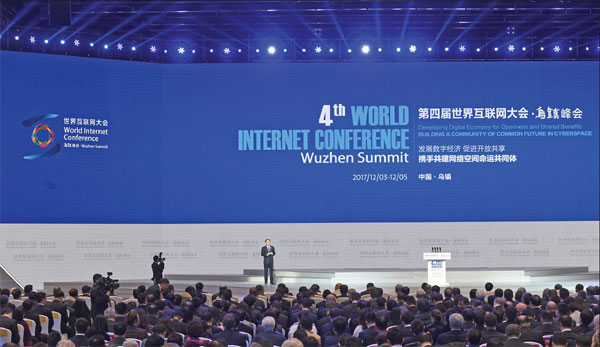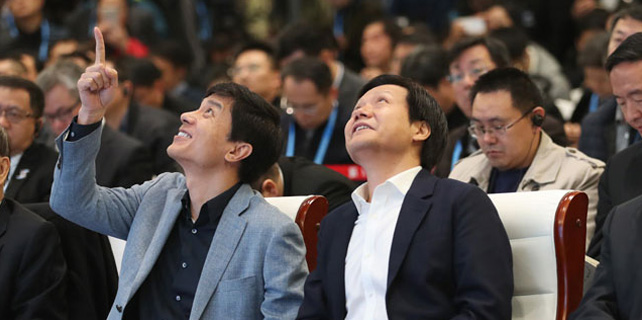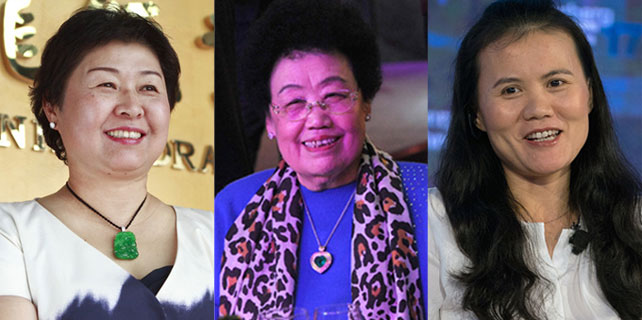Digital eminence
Companies from around the world invited to join in China's internet success story
China's digital economy is now bigger than the entire economies of the United Kingdom, France or Italy and more than eight times that of Africa's largest economy, Nigeria.
The impression of the scale of cyberspace in the world's second-largest economy was what many took away from the 4th World Internet Conference in Wuzhen, Zhejiang province.
More than 1,500 entrepreneurs, academics and officials from 80 countries descended on the ancient water town known as the "Venice of the East" for the three-day event, which began on Dec 3.

|
The 4th World Internet Conference opens in Wuzhen, Zhejiang province, on Dec 3. More than 1,500 entrepreneurs, academics and officials from 80 countries attended. Huang Zongzhi / Xinhua |
China's digital economy was worth 22.6 trillion yuan ($3.41 trillion; 2.9 trillion euros; £2.6 trillion) in 2016, up by 18.9 percent year-on-year, according to the China Academy of Information and Communications Technology.
This compares with the entire GDP of the UK ($2.63 trillion), France ($2.47 trillion) and Nigeria ($406 billion) in the same year, according to the International Monetary Fund. Even that of Germany ($3.48 trillion), Europe's largest economy, was only marginally ahead.
Nearly one in five (751 million) of the 3.89 billion internet users around the world are now in China, according to government figures released ahead of the conference.
President Xi Jinping sent a congratulatory letter to the conference, saying he wanted companies from across the world to participate in China's internet success story.
"Building a community of common future in cyberspace has increasingly become the widespread common understanding of international society," he said.
"China's door to the world will never close, but will only open wider." His remarks fitted in with the theme of this year's conference: "Developing Digital Economy for Openness and Shared Benefits - Building a Community of Common Future in Cyberspace".
Tim Cook, CEO of Apple, one of the most high-profile attendees, said he and his company shared the aims of the conference.
"The theme of this conference - developing a digital economy for openness and shared benefits - is a vision we at Apple share," he said.
"We are proud to have worked alongside many of our partners in China to help build a community that will join a common future in cyberspace."
At the opening day of the conference, which was hosted by the Cyberspace Administration of China and the Zhejiang provincial government, awards were presented for outstanding achievements in the field of the internet.
One of the winners of the World Leading Internet Scientific and Technological Achievement awards was Mobike Technology.
Few companies have had such a dramatic impact on the physical landscape of China and other cities around the world as the Beijing-based company and its competitors, including ofo, with millions of consumers now using their dockless bikes.
Davis Wang, Mobike's co-founder and chief executive officer, recalled sitting in his office with colleagues three years ago, wondering what the solution was to air pollution and traffic jams.
"We noticed also that the usage of bicycles had declined and wondered whether this could be reversed. We came up with a solution that combined smartphone technology with GPS tracking systems," he said while collecting his company's award.
Among the 13 other winners - which included a mix of Chinese and US tech giants including Baidu, Alibaba, Microsoft, Amazon and Apple, but no European ones - was telecommunications giant Huawei Technologies, which won for its next-generation mobile communications 3GPP 5G Pre-Commercial System.
One of the most anticipated launches was that of 5G - the fifth generation of mobile communications - which is expected to be rolled out globally by 2020.
Xu Zhijun, rotating chief executive officer of Huawei, told the conference that 5G would enable a 6-gigabyte file such as a movie to be downloaded in just two seconds.
It will have major implications for big data and autonomous vehicles, in which China hopes to be a global leader.
Chinese companies could play a leading role in new mobile technology.
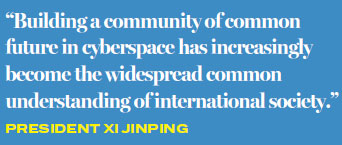
China Mobile, the world's largest telecommunications carrier by subscribers, said it seeks to deploy more than 10,000 5G base stations by 2020 and aims to launch a pre-commercial service next year.
China's mobile carriers are forecast to invest at least $173 billion in 5G construction in the six years up to 2025, according to US-based global investment bank Jefferies. This is 48 percent more than the total spent on 4G from 2013-20.
5G is also forecast to drive 6.3 trillion yuan of economic output by 2030, according to a report by the China Academy of Information and Communications Technology.
Luigi Gambardella, co-founder and president of the ChinaEU Association for Digital, a Brussels-based nonprofit organization, says the new technology will cause the digital economy to "explode".
"It is a revolution, a new era that is coming. It will also happen that fast," he says.
Gambardella, a former vice-president for relations with the European Union at Telecom Italia who attended the conference, says the new mobile communications will see other technologies go to a new level.
"It is the infrastructure that will enable a lot of new technologies and the collection of data that will fuel the digital economy."
With many leading tech figures from around the world, one major area of discussion was the global governance of the internet and its regulations to deal with such issues as cybersecurity and cross-border e-commerce.
Xu Lin, minister of the Cyberspace Administration of China, said it was important for countries to work together to develop policy and regulations, particularly in such areas as regulating network facilities, information technology, cross-border e-commerce, data distribution and other digital-related fields.
"Working together, we should deepen global cooperation on cybersecurity, strengthen data protection and combat crimes in the field of digital economy," he said.
He said China was committed to following through on existing initiatives.
"We will actively implement the G20 Digital Economy Development and Cooperation Initiative and deepen international cooperation related to the Belt and Road Initiative."
Wang Huiyao, founder and president of the Center for China and Globalization, one of China's largest independent think tanks, says getting a global architecture in place for the development of cross border e-commerce is vital.
"It is OK if you want to order a book or something that comes in a parcel, but if, say, you want to buy an air conditioner from somewhere, it is likely to get stuck at customs. There is confusion as to what customs duties should be levied and many other aspects of this. This is going to be a big problem when half of the world economy is set to be made up of e-commerce by 2030, " he says.
"This is very difficult to do through the World Trade Organization, because it would be almost impossible to get 200 countries to agree. There needs to be something like an I20 dealing with internet issues, like there is currently a B20 that creates a dialogue for business issues under the umbrella of the G20."
Gambardella from the ChinaEU Association for Digital says establishing an overarching regulatory framework is increasingly difficult to do without major input from China.
"It is the most important country in the world for the internet and it is not possible to discuss future policy or regulation without China. China has to be part of any discussion on the future of the internet.
"The US and Europe have to recognize this as a fact. It is not the same as 10 or 15 years ago when the internet was quite new to China."
This rapid growth was highlighted in research done by the China Internet Network Information Center.
The number of people who access the web using their mobile phones has increased more than 14-fold, from 50.4 million in 2007 to 724 million this year.
In any given minute in China, 194,000 people are video-or audio-chatting on WeChat, China's top social networking app, owned by e-commerce giant Tencent, according to research by Tech in Asia, a technology website.
During the same time frame, 770 people spend $1.13 million on purchases through Alibaba Group's online marketplaces.
Pony Ma, chairman and CEO of Tencent Holdings, told the conference that because of this massive expansion, internet companies such as his had a responsibility to the people who used their services.
"With the rising digital economy, internet-based technology enterprises should be aware of the responsibilities they need to shoulder," he said.
"Internet access has become a basic human need, just like water and electricity."
Wang Huning, a member of the Standing Committee of the CPC Central Committee Political Bureau, said in his opening address that he wanted companies from across the world to invest in China.
"We sincerely welcome internet companies and entrepreneurs of all countries to invest here in China. We also hope that various markets will further open up to Chinese enterprises."
The conference concluded with the organizers issuing a statement that the conference "marked a firm step forward for the consensus of global internet development and administration".
At a final news conference, industry experts and entrepreneurs delivered the message that China is now expected to provide new impetus to the development of internet technologies around the world.
Ren Xianliang, deputy director of the Cyberspace Administration of China, said China was now a leader rather than a follower.
"China has grown from being a beneficiary of internet development to being a contributor and leader in certain internet technologies," he said.
Thomas Kwesi Quartey, vice-chairman of the African Union, said in a speech at the closing ceremony that China had become a role model for his continent in this area.
"China presents possibilities of what can be done in our own countries for eliminating the digital divide," he said.
Ma Si, Wang Ying, Ouyang Shijia, Zhu Lixin, Zhang Zhihao and Cheng Yu contributed to this story.
andrewmoody@chinadaily.com.cn
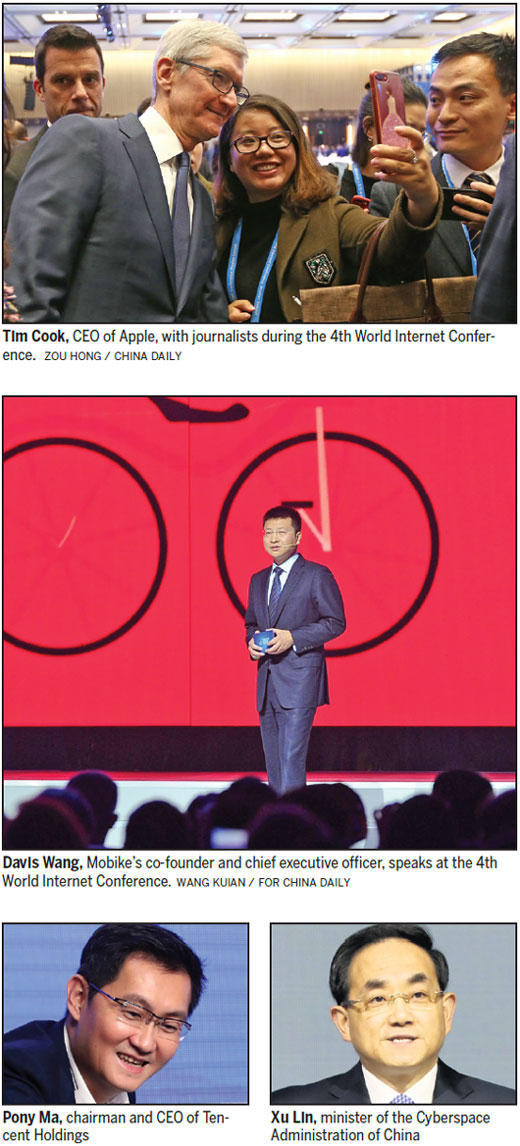
(China Daily European Weekly 12/08/2017 page1)



